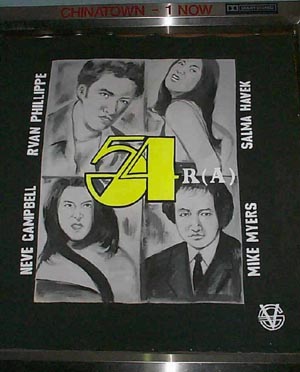

|
Film Review |
Ah! You pay too much!
by Rich Elias, Apr 8, 1999 Singapore merchants call Western tourists "gwello," a Chinese word meaning "white devil." But after two weeks in Singapore (business trip), my Chinese name ought to be Max Out Visa. This is a great country if your idea of fun is to shop and eat, two pastimes Americans indulge in, but in Singapore it goes to extremes. A canned announcement on a boat ride down the Singapore river tells us gwellos that "More than 35,000 restaurants line the river banks." This is hard to believe until you dine every night at the food courts throughout the city, clusters of stalls that serve every variety of Asian food, including local favorites like Pig Organ Soup. (Haven't tried it.) My hunch is that for a modern Singaporean, the perfect afternoon starts with haggling over the price of state-of-the-art computer equipment at one of a dozen electronics malls in the city, then adjourning to one of Singapore's 150 MacDonalds restaurants for lunch. American fast food is popular with the younger crowd here, as are coffee joints like Starbucks. These are trendy, even though the local tea is much better than a latte far from its Seattle home. The perfect evening for that Singaporean is to meet an American friend in a bar, ask what he paid for his new camera (or watch or stereo set) and then announce, smugly, "Ah! You pay too much!" The city is clotted with shopping plazas everyone is forced to walk through because the government has cunning arranged for the weather to stay hot and humid. But the price you pay for these moments of air-conditioning is unimaginable, until next month's Visa bill arrives. Then it's just shocking. After a few forays to do battle with Chinese merchants, I figured out the ritual. No one pays the sticker price for anything. You start by expressing interest is, say, a pair of jade earrings. The man across the counter says, "$900. For you, special price. I like your face. So $500." He likes my face? Bargaining begins in earnest when you say, "Too much." The ploy now is for him to whip out a calculator and punch in an even lower number. If you hesitate, the merchant asks, "How much you want to spend?" I always say, "I don't want to spend anything" and he laughs even though he must hear this joke dozens of times a day. The novice shopper will continue to bargain. But us old Singapore hands (I've been here nearly two weeks) know that the right move is to say, "I think I'll look over there" and point to the jewelry shop next door, one of several dozen such shops in the plaza. Merchants don't feel sorry if they lose your money, but they can't stand the thought that their neighbor might get it. By this point, it's all a game anyway. So in one carefully-choreographed move, you take out your credit card and he puts the earrings in a bag. You haven't struck a deal yet, but each of you is conducting a symbolic dialogue between greed and covetousness. A few minutes later you settle on a price, walk away poorer, and feel deflated when a Chinese friend tells you over drinks, "Ah! You pay too much!" This is a tough town to beat. Speaking of movies, four new English-language movies opened here last Friday. American movies are very popular here, as they are all over the world. But movies from China and India also attract an audience in a city in which English is the official "working" language but Chinese, Tamil, and Malay are also "official." As always, I have to wonder about the impression U.S. movies make on overseas viewers. Violence? It seems that ultra-violent American movies don't play here. Local taste favors Hong Kong fist-flingers and imitations of these. (A newspaper comment described a recent Jackie Chan and Mark Wahlberg number as "yet another action movie," the tone suggesting the writer's weariness with the genre). Nominees for Best Actor in the upcoming Hong Kong Film Festival include (of the names I recognize) Chan and Sonny Chiba, neither of whom acts. Wouldn't want to meet them in a dark alley, though. The Singapore Straits Times provided a moment's entertainment last Friday when I skimmed past the computer ads to look at the movie page. None of that week's new movies tempted me from my hotel, but the headlines were fun: Four new English-language movies are opening here, and the headlines on the reviews made me laugh: "Killer shots but director loses aim" - "The Thin Red Line"; "Help! I have kids" - "Stepmom"; "Mum, you aren't so bad after all" - "One True Thing"; and "Bravo, she can sing" - "Little Voice". (This is a newspaper that headlined a story about new findings on infant circumcision with "Circumcision is pointless.")
Poster for "54" in Singapore It was the poster that nailed me to the spot. Print ads and posters here are the same as in the states, except for this one, which managed (ineptly) to make Neve Campbell, Salma Hayek, Ryan Phillipe, and Mike Myers look Chinese. I'd sue. But then again, making the stars in this rotten picture look Chinese on the poster might help it make money here. But as my Chinese friends would say, if you paid to see this movie, "Ah! You pay too much!"
Review of "54" More culture reviews Back to Front Page |